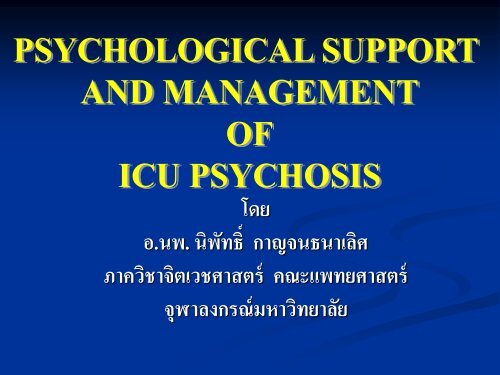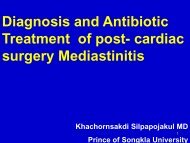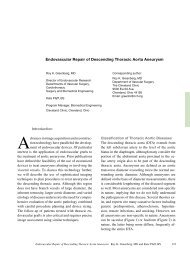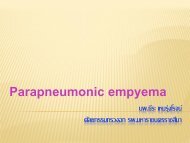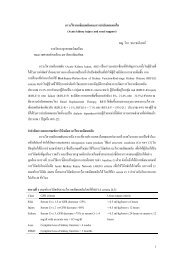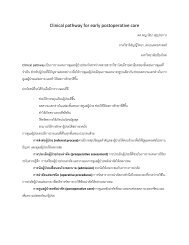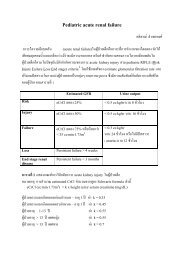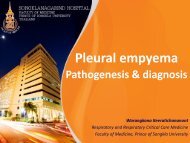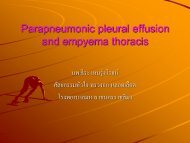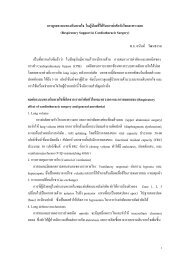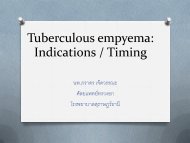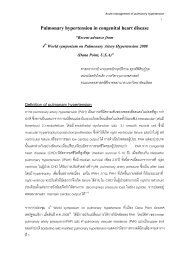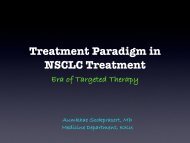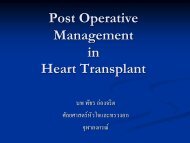Psychological Support and Mgmt of ICU Psychosis
Psychological Support and Mgmt of ICU Psychosis
Psychological Support and Mgmt of ICU Psychosis
You also want an ePaper? Increase the reach of your titles
YUMPU automatically turns print PDFs into web optimized ePapers that Google loves.
โดยอ.นพ. นิพัทธิ ์ กาญจนธนาเลิศภาควิชาจิตเวชศาสตร์ คณะแพทยศาสตร์จุฬาลงกรณ์มหาวิทยาลัย
Common Problems• Fear <strong>and</strong> overt anxiety มักเกิดใน 2-3 วันแรก ที่ผู้ป่ วยเข้ำมำใน<strong>ICU</strong>• Depression มักเกิดตำมหลังมำในวันต่อมำประมำณ 3-4 วัน• Various behavior problems มักเกิดหลังจำกที่ Fear <strong>and</strong>anxiety น้อยลงหรือหำยไปแล้ว• Brief reactive psychosis เกิดได้ค่อนข้ำงบ่อยในผู้ป่ วยNeurosurgical และ postcardiac surgery intensive careunit แต่พบน้อยกว่ำในหอผู้ป่ วยหนักของอำยุรกรรม (medical <strong>ICU</strong>)• Delirium
1. Sensory depivation (ภาวะพรากความรุ ้สึก)ภำวะพรำกควำมรู้สึก เป็ นภำวะที่มีกำรขำดหรือมีกำรเปลี่ยนแปลงของสิ่งเร้ำที่ส่งผ่ำนอวัยวะรับควำมรู้สึกไปยีงสมอง หรืออำจเกิดจำกกำรได้รับสิ่งเร้ำที่ไม่เพียงพอ หรือสิ่งเร้ำที่ซ ้ำซำก จ ำเจ หรือ อวัยวะรับควำมรู้สึกไม่ท ำหน้ำที่ตำมปกติ หรือขำดควำมสำมำรถในกำรรับรู้ของข้อมูลต่ำงๆ จำกสิ่งแวดล้อม ในกำรเกิดภำวะพรำกควำมรู้สึกพฤติกรรมที่แสดงถึงกำรตอบสนองต่อสิ่งเร้ำของบุคคลจะเปลี่ยนไปทั ้งนี ้เนื่องจำกผลกระทบต่อกำรท ำงำนของ RAS (ReticularActivating System)
SENSORY DEPRESSIVATIONCharacteristic Of Sensory Deprivation State
II. Delirium• Circulatory disturbance• Metabolism• Brain trauma• Drugs induced <strong>and</strong> poisons• Tumors• Epilepsy• Infection
Delirium
PATIENTS WITH HIGH RISKFOR DEVELOPING DELIRIUM
The ten most frequent h cause <strong>of</strong> delirium
When do symptoms require treatment?Treatment <strong>of</strong> behaviour should be considered inthe following circumstances :• When it is distressing to the patient caregivers ;• When it is dangerous to self or others• When it interferes with basic self-caresocialization <strong>and</strong> quality <strong>of</strong> life
• EPSLIMITATION OF CONVENTIONAL• TARDIVE DYSKINESIA• ANTICHOLINERGIC• HYPOTENSION• OVER-SEDATIONNEUROLEPTICS• ANTICHOLINERGIC• MEMORY IMPAIR• SEDATION• CONFUSION• Drug interaction withcholinesterase inhibitor
Special Considerations for Antipsychotic Usein Older Patients• risk <strong>of</strong> EPS, TD• Sensitivity to anticholinergic effects• 80% have ≥1 serious comorbid medical illness• Age-related differences in drug metabolism• Polypharmacy (increasing risk <strong>of</strong> drug-druginteractions)• >20% <strong>of</strong> nursing home residents on 10 or moremeds 1EPS = extrapyramidal symptoms; TD = tardive dyskinesia.1.Bermabei et al. J Gerontol A Biol Sci Med Sci. 1999;54:M25.
Impact <strong>of</strong> Adverse Effects in theElderly Population• EPS <strong>and</strong> TD : incoordination, feeding problems,disfigurement, social isolation, falls <strong>and</strong> fractures• Sedation : interferes with ADL• Postural hypotension : falls <strong>and</strong> fractures• Anticholinergic effects• Central: confusion <strong>and</strong> memory impairment• Peripheral: blurred vision, urinary retention, constipation,dry mouthADL = activity <strong>of</strong> daily living
Average Dosages for elderly PatientsDrug• Clozapine• Risperidone• Olanzapine• QuetiapineInitial,Mg/day6.25 – 12.50.5 – 12.5 – 525 - 50Typical range,Mg/day50 – 1501 – 2.55 – 1575 - 200
Pharmacological Treatment <strong>of</strong> BPSD:Placebo-Controlled StudiesDrug Co./Gov. Publication Venue ResultCarbamazepine NIMH Tariot et al. 1998 SignificantRisperidone Janssen Katz et al. 1999 NH SignificantRisperidone Janssen De Deyn et al. 1999 NH SignificantOlanzapine Lilly Street et al. 2000 NH SignificantContinuedFinkel 2001
Mood Stabilizer: Divalproex• RCT in nursing home 1• 6-week placebo vs. individual dose (mean serum level 45mcg/ml)• 56 subjects with dementia; 6 subjects discontinued treatment• Medically trail population• Results : trends for decreased scores on measures <strong>of</strong> agitation<strong>and</strong> psychosis, also on CGI ratings• Did not reach level <strong>of</strong> statistical significance• Sujects with higher baseline MMSE more likely to improve• Tolerability: Sedation, gastrointestinal symptoms, fallcommon• 6-week open-label extension 2• Sedaiton <strong>and</strong> falls continued to be most common side effects1. Porsteinsson AP, et al. Am J Geriatr Psychiatry. 2001;9:58-66.2. Porsteinsson AP, et al. Am J Geriatr Psychiatry. 2003;11:434-440.
Vascular depression hypothesisPremises• Vascular disorders are associated withdepression• Hyperintensities on MRI areassociated with vascular disorder• Subcortical disease is associated withdepression• Late-onset depression is associatedwith greater vascular disease <strong>and</strong>vascular risk• Late-onset depression is associatedwith more deep white matterabnormality than early-onsetdepression in later lifeProposed features• Mainly late-onset• Reduced depressive ideation• Reduced insight• More overall morbidity• Apathy <strong>and</strong> retardation• More cognitive impairment(particularly executivedysfunction)• Poorer recovery
Mood Stabilizer: Divalproex• RCT in nursing home 1• 6-week placebo vs. individual dose (mean serum level 45mcg/ml)• 56 subjects with dementia; 6 subjects discontinued treatment• Medically trail population• Results : trends for decreased scores on measures <strong>of</strong> agitation<strong>and</strong> psychosis, also on CGI ratings• Did not reach level <strong>of</strong> statistical significance• Sujects with higher baseline MMSE more likely to improve• Tolerability: Sedation, gastrointestinal symptoms, fallcommon• 6-week open-label extension 2• Sedaiton <strong>and</strong> falls continued to be most common side effects1. Porsteinsson AP, et al. Am J Geriatr Psychiatry. 2001;9:58-66.2. Porsteinsson AP, et al. Am J Geriatr Psychiatry. 2003;11:434-440.
MANY BEHAVIORAL SYMPTOMS FOUND IN FTD(INCLUDING IMPULSIVE DISINHIBITION,DEPRESSIVE SYMPTOMS, CARBOHYDRATECRAVING WITH WEIGHT GAIN, AND COMPULSIONS)HAVE BEEN DESCRIBED IN NONDEMENTIAPOPULATION, AMONG NONDEMENTED PATIENTS,THESE SYMPTOMS OFTEN IMPROVE WHENTREATED WITH MEDICATIONS THAT INCREASESEROTONIN ACTIVITY.
Selective Serotonin Reuptake Inhibitors• Highly effective <strong>and</strong> well tolerated treatments fordepression following TBI 1-8• Present literature is strongest for sertraline 1,3• Treatment with fluoxetine produced significant side effects in>50% <strong>of</strong> patients 5• Anticholinergic effects <strong>of</strong> paroxetine may be problematic 9-10• Effective treatment associated with improvement incognition, other postconcussive symptoms, <strong>and</strong> patientperception <strong>of</strong> severity <strong>of</strong> cognitive impairment 31.Fann, et al. 2000;2.Kant, et al. 1998;3.Fann, et al. 2001;4.Perino, et al. 2001;5.Cassidy. 1989;6.Bessette <strong>and</strong>Peterson. 1992;7.Wroblewski,et al.1992;8.Breen, et al. 1997;9.Fujishiro, et al. 2002;10.Schmitt, et al. 2001.
Antidepressants: SSRIs• Paroxetine <strong>and</strong> fluoxetine• Limited to open label <strong>and</strong> case reports• Citalopram• 85 inpatients with dementia <strong>and</strong> agitation/psychosis• 17-day duration, double blind, r<strong>and</strong>omized to citalopram 20 mg,perphenazine 6.5 mg (mean), or placebo• Only 49% (39 subjects) completed trial• Citalopram but not perphenazine separated from placebo• Treatment effect size=0.64• Small open-label trials• Improvement in vocalizations• No published data for escitalopramSSRIs=Selective Serotonin reuptake inhibitors.1. Pollock BG, et al. Am J Psychiatry. 2002;159:460-465.2. Pollock BG, et al. Am J Geriatr Psychiatry. 1997;5:70-78.3. Kim KY, et al. J Geriatr Psychiatry Neurol. 2000;13:53-55.


